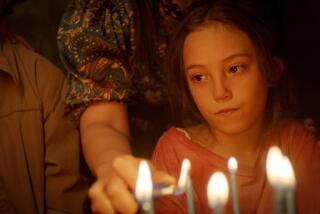Movie review: ‘Winter’s Bone’
- Share via
Intense, immersive and in control, “Winter’s Bone” has an art house soul inside a B picture body, and that proves to be a potent combination indeed.
Directed and co-written by Debra Granik, this atmospheric tale of teenager Ree Dolly’s bleak and desperate search for her father in the clannish, impoverished Ozarks meshes character concerns with narrative drive so adroitly that it won both the Grand Jury Prize and the Waldo Salt Screenwriting Award at the Sundance Film Festival.
For Granik, who along with Anne Rosellini adapted Daniel Woodrell’s “country noir” novel, getting involved in desperate circumstances is becoming second nature. Her debut feature, “Down to the Bone,” featuring a breakthrough performance by Vera Farmiga, was similarly grounded in an environment where survival was not to be taken for granted.
But because “Winter’s Bone” is set among the mountain people of the Ozarks, a culture that is easy to caricature but hard to know, ensuring authenticity involved a greater journey. Granik and her team ended up spending two years immersing themselves in the area, even casting the daughter of the family that lived in the key location house as Ree’s younger sister.
That passion does run the risk of fetishizing authenticity, and there are moments when the film’s dialogue is hard to understand and when the very physical accuracy of the re-creation calls attention to itself in ways it shouldn’t.
But what saves “Winter’s Bone” every time is the potency of the film’s key actors. Strongly directed by Granik, who did similar fine work with Farmiga, these persuasive and compelling performances provide the psychological integrity that holds the scenario together.
At the top of the list is 18-year-old Jennifer Lawrence, a native of Louisville who faultlessly disappears inside the central role of Ree, a young woman who has more than her share of difficulties even before the plot kicks in. With a mother who is close to catatonic and a father who, like many of his mountain neighbors, cooks methamphetamine for a living, Ree has to be the responsible one in the family, tutoring her two younger siblings in spelling, cooking and marksmanship.
Then things get worse. The local sheriff tells Ree that not only has her father, Jessup Dolly, skipped out on bail and disappeared, but he has put the family house up as security. If Jessup is not found in a week, the bail company will take the house and just like that the Dollys will be homeless and destitute.
So it falls to Ree to do what male heroes from Jason and the Argonauts seeking the Golden Fleece to Galahad searching for the Holy Grail have done: She goes on a quest. More than that, she sets out to find her father in a world where women acting independently is actively discouraged. When someone asks her, “Ain’t you got no men folk to do this?,” the answer is clearly no.
Ree undertakes this classic genre exercise in an especially dangerous, convincingly brutal world. Though she is related by blood to many of the people she will be asking for help, the pervasive drug culture that has wreaked havoc in the area has made everyone even more close-mouthed, suspicious and not averse to mayhem. Ree may be proud to be “a Dolly bread and buttered,” as she puts it, but Dollywood this is definitely not.
In addition to being clannish, the Ozark culture Ree lives in is ruled by strict behavioral codes, which “Winter’s Bone” carefully delineates. “Never ask for what ought to be offered,” Ree instructs her younger brother, and it is clear that, no matter how close you are to the owner, another person’s house can’t be entered without a specific invitation.
To even have a prayer of succeeding in this difficult world, toughness is essential and Lawrence is especially successful at conveying Ree’s stubborn, at times sullen, determination. Forthright and unafraid, she has a weakness for turning every situation into a confrontation, but given how desperate her plight is, there really isn’t much choice.
A hero like Ree is often only as memorable as the obstacles she meets along the way, and “Winter’s Bone” is blessed with two terrific antagonists, starting with Teardrop, her father’s frankly terrifying older brother.
Played with unnerving conviction by John Hawkes, Teardrop scares even the scariest people in Ree’s neck of the woods. With his haggard face and deep-set, almost satanic eyes, Teardrop is the area’s intimidating lone wolf, and while Lawrence’s performance will get more attention it is Hawkes’ work that truly makes us believe that this world exists.
Equally unsettling and site specific is Dale Dickey’s excellent work as Merab, the wife of local patriarch Thump Milton. Her face as hard as an ax, her manner convincingly threatening, Dickey’s Merab persuades us she’s capable of doing what needs to be done.
As Ree attempts to make her way through this hostile, hermetic world, we don’t wonder at her increasing air of desperation. Whatever information she gets, whatever closure she achieves, we know it will be hard-earned. Perhaps “Winter’s Bone’s” greatest achievement is to allow us to feel that in our bones as well.
More to Read
Only good movies
Get the Indie Focus newsletter, Mark Olsen's weekly guide to the world of cinema.
You may occasionally receive promotional content from the Los Angeles Times.










